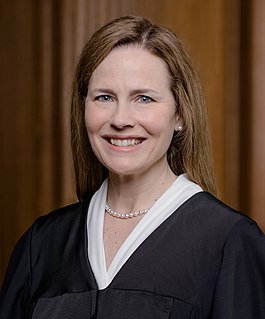A Quote by Samuel Alito
A judge can't have any preferred outcome in any particular case. The judge's only obligation - and it's a solemn obligation - is to the rule of law.
Quote Topics
Related Quotes
When I became a judge, I stopped being a practicing attorney. And that was a big change in role.The role of a practicing attorney is to achieve a desirable result for the client in the particular case at hand. But a judge can't think that way. A judge can't have any agenda, a judge can't have any preferred outcome in any particular case and a judge certainly doesn't have a client.
The interpretation of the laws is the proper and peculiar province of the courts. A constitution is, in fact, and must be regarded by the judges, as fundamental law. It therefore belongs to them to ascertain its meaning, as well as the meaning of any particular act proceeding from the legislative body. If there should happen to be an irreconcilable variance between the two, that which has the superior obligation and validity ought, of course, to be preferred; or, in other words, the Constitution ought to be preferred to the statute, the intention of the people to the intention of their agents.
































